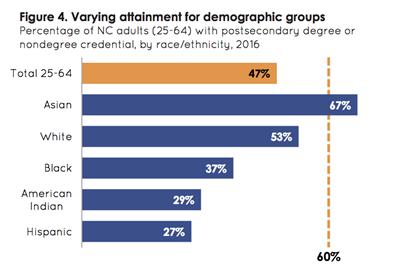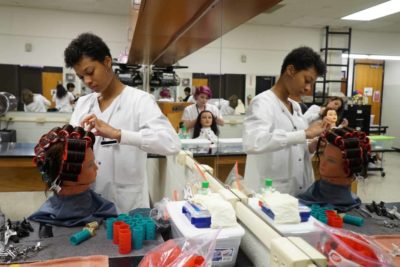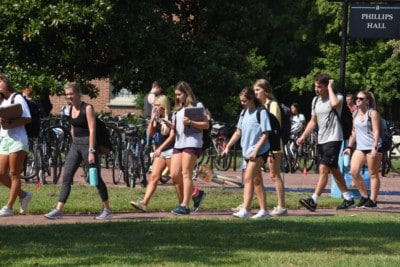

The following is Mary Ann Wolf’s “Final Word” from the April 17, 2021 broadcast of Education Matters: “N.C. sets goal for 2M to get postsecondary degree by 2030.”
A very astute superintendent once shared with me that: “You can’t finish college if you don’t start it.”
He was referring to how he had built opportunities for his high school students to earn a significant number of college credits while still in high school to set them on a pathway to earning a degree or high quality credential. While this approach certainly made college courses more affordable, he also shared the importance of students seeing themselves as college students capable of completing the coursework successfully.
North Carolina is working to ensure that more of our students and residents have a high quality postsecondary credential or degree, as postsecondary credentials and degrees are becoming increasingly important for our current and future labor market.
The state, through myFutureNC, has set an ambitious goal for 2 million North Carolinians to have a high-quality postsecondary credential or degree by 2030. While we are making progress, we still have much to do. As of 2018, 1.3 million North Carolina residents held a postsecondary credential or degree. Making this goal a reality requires strategic investments and supports for districts, schools, and students.


Here in North Carolina, only about one-quarter of those who responded to a 2018 EducationNC survey believed that their educational opportunities were very well aligned with jobs available in their communities, and about the same proportion believed that their educational opportunities provided avenues for gaining needed work skills for available jobs (myFutureNC, 2020, Leandro Comprehensive Remedial Action Plan, 2021).
Today, we heard from a variety of state education leaders that are doing that important work across North Carolina. MyFutureNC has been established to lead progress on this attainment goal. Cecilia Holden, myFutureNC CEO and President, shared the emphasis on apprenticeships and NC’s First in FAFSA (Free Application for Federal Student Aid) campaign, which seeks to have more students on their way to being able to attend college in an affordable way.
Community colleges have long been drivers of individual and community opportunities and economic prosperity. J.B. Buxton, the president of Durham Tech, shared with us how the pathways from K-12 districts, to Community Colleges, to 4-year universities can be more seamless for students. We need to increase awareness and integrated supports so that students and families know what opportunities are available and how to access them.
Transylvania County Superintendent Dr. Jeff McDaris, shared the multitude of opportunities available to students through the Career and Technical Education programs and collaboration with Blue Ridge Community College. He emphasized the opportunities for credentials and meeting the regional job market needs, as well as providing students with a chance to explore various careers through courses, internships, and apprenticeships.
They all shared the importance of the collaboration among K-12 schools, community colleges and universities, business and industry, local and state governments, and communities to make this goal a reality. They also referenced the need to expand work-based learning models that help educators, students, and businesses work together – from internships to co-ops to on-the-job training programs to apprenticeships.
Growing our understanding of what true apprenticeship opportunities look like, increasing completion of the FAFSA, as a gateway to attending college, and investing in counselors in K-12 schools are also critical components to attaining this goal and ensuring that all students in our schools have the opportunity to reach their potential.
North Carolina has the capacity in people, partners, and resources to make the Postsecondary Attainment goal a reality. Developing more seamless pathways for students and increasing awareness and access to them through our K-12 schools will benefit our students and families across North Carolina, as well as ensure that our state has the workforce and human capacity we need to continue to have a thriving community.
As that superintendent understood many years ago, we must help our students explore the possibilities and have access to career and college pathways.




